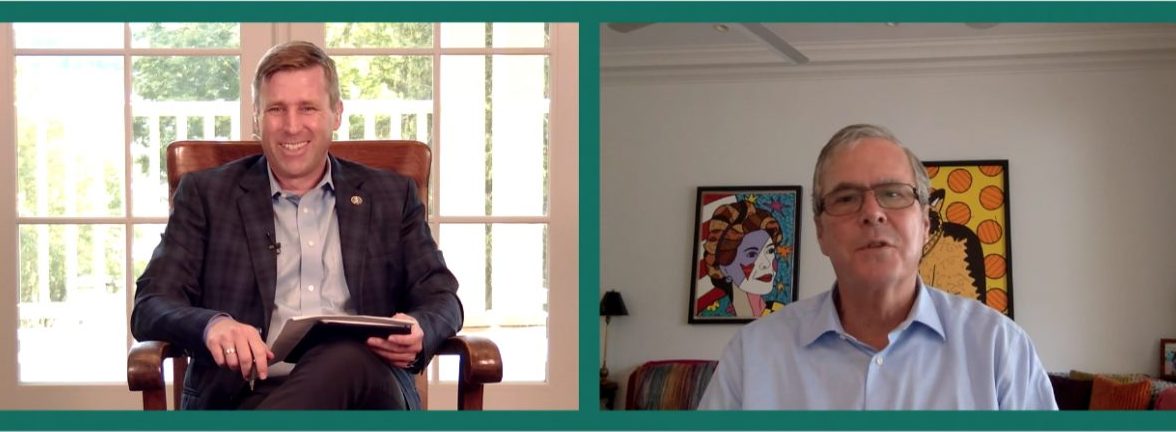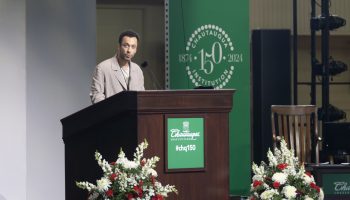While visiting 250 schools during his 1998 gubernatorial campaign, Jeb Bush, former governor of Florida, watched a student practicing for the HSCT test, a test that students needed to pass to graduate high school. Bush said the student could not answer the question, “If a baseball game starts at 3 p.m. and ends at 4:30 p.m., how long was the game?”
“Having all of these kinds of personal stories as a candidate really supercharged me as governor to make sure that I did everything I could to change the system so that (students), particularly the lower-performing kids, would have a fighting chance,” Bush said. “I think (education) is the great equalizer. Quality education will allow for many different possibilities for a young person as they start their life. The opposite is true if they don’t have the quality education.”
As well as being the governor of Florida from 1999 to 2007, Bush was a candidate for the 2016 Republican presidential nomination and is founder, president and chairman of the board of directors of the Foundation for Excellence in Education. At 10:45 a.m. EDT Wednesday, Aug. 5, 2020, on the CHQ Assembly Video Platform, Bush joined in conversation with Chautauqua Institution President Michael E. Hill on “Fostering Bold and Transformational Education Reform.” Bush discussed the actions he took to transform the public education system in Florida, what school systems and educators need to focus on today and how the pandemic has impacted the education sector.
Hill asked Bush to outline the education overhaul he conducted as governor of Florida, and why he did it.
Bush said when he took office, Florida ranked last in the country in high school graduation rates.
When he was running for office, one of his plans involved more accountability in education, such as if a school was rated an “F,” with the highest rank being “A,” two times in four years, then every child had the option of attending a private school or a better-performing public school. Bush said that plan also held back students at the end of third grade if they were functionally illiterate.
“If you’re telling people you have these high expectations for every kid, then you have to (have) the resources to be able to back it up,” Bush said. “A lot of times, people advocate reforms that don’t have the resources to actually make the reforms work.”
Bush said reading coaches were hired at every school and teachers were better trained to teach reading. He said Florida went from the bottom of the 50 states, to sixth, in fourth- and eighth-grade reading and math levels.
“The kids that led the way were low-income kids, Hispanic kids, African-American kids, kids with learning disabilities, because we measured and we had accountability around them and the system,” Bush said. “The entire system was really organized to make sure that they rose up.”
Hill asked Bush about over-testing students, and how to measure their skills while not simply teaching them how to get high scores on tests.
“Great teachers don’t teach to the test; they teach to the expectations that are set by educators,” Bush said.
Bush believes that testing as a measurement is important, and also that there is too much testing. He believes that testing should be done at the end of the semester, instead of during the middle, as in some schools. These tests should diagnose exactly where the student stands, and Bush said this information should be given to their parents, their teacher, as well as their teacher the following year.
Hill asked Bush how his plans on school choice played out in Florida — plans which many viewed as dismantling traditional public schools.
Bush helped set up the first charter school in Florida, Liberty City Charter School, which first taught 90 Black students whose parents chose to send their children there. These parents were directly involved with the school and, Bush said, helped shape how the school was governed.
“That, to me, is what public education ought to be about. It ought to be driven by parents empowered with the decisions,” Bush said. “The school was successful. And it was a great learning experience.”
Bush said systems and processes are not what is important.
“I’ve never felt like the system is what needs to be protected,” Bush said. “It’s how do we make sure … we customize the learning experience where (children) are the ones that are front and center.”
Hill asked Bush about the weaknesses the COVID-19 pandemic has exposed in the educational system.
Bush said that the pandemic has made equity issues even more prominent. He gave an example: a parent who cannot work from home, with a child who cannot go to school.
“That creates massive strains, not just on the education system but on family life, and we’re seeing it play out,” he said. “We’re seeing increases in drug use and foster care. Child abuse is up. Domestic violence is up. Alcoholism is up. These societal stresses have a direct impact, particularly on lower-income families and lower-income students.”
Bush also said that well-funded school systems have and had major issues with the pandemic; technical issues can interrupt or block virtual delivery, and students may only be able to attend remotely three times a week rather than six hours a day.
“I have a lot of respect for people making these decisions all across the country, because there is no easy way to do this,” Bush said. “In this hyper-politicized environment, when you make a decision, someone’s going to be mad. Then when it doesn’t work exactly right, because there’s a lot of unknowns on this, you’re going to be criticized.”
Hill then asked Bush if systemic racism is an issue in the American education system specifically, and if it is, what action can be taken.
Bush talked about how KIPP Academy, one of the top-performing charter school organizations in the U.S., decided to stop using their motto “Work hard. Be nice.,” after George Floyd’s murder on May 25.
“They had a big debate amongst their community … the families and the teachers, and they eliminated that, because the point was that systemic racism is so pervasive that working hard and being nice isn’t enough,” Bush said. “But they didn’t replace it with something, either.”
Bush thinks that there is systemic racism in education. One example he gave is that in Miami school districts, teachers who are higher paid — typically those who have been teaching in the area longer — can choose where they work. These teachers may move to schools that have students that are “more capable of taking on higher-order work.”
“These are systemic elements of our system that end up disproportionately hurting lower-income kids that are disproportionately students of color,” he said. “So I do think that there’s systemic racism from that perspective.”
Bush said the best teachers should be teaching in the most-challenged schools, and they should be paid higher for working at these schools.
“I’m not sure it’s inherently racist, that it’s designed to be racist, but the net effect is the same; and fixing it is important, rather than having the debate about what is systemic,” Bush said.
Hill’s final question was: If education were to be at the center of the next presidential debate, what question Bush would ask the candidates.
“I would say, ‘Why aren’t you fixing the digital divide?’” Bush said. “‘Why don’t you make digital infrastructure the highest priority, so that this incredibly generous and prosperous country gives everybody a chance to be successful, making sure that everybody, every kid irrespective of the level of income, has a device that allows him to learn at home?’”





